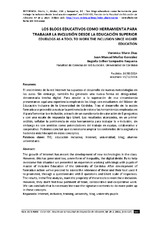Los blogs educativos como herramienta para trabajar la inclusion desde la Educación Superior
Autor
Marín-Díaz, Verónica
Muñoz González, Juan Manuel
Sampedro Requena, Begoña
Editor
Universidad de Castilla La ManchaFecha
2014Materia
TICEducación inclusiva
Internet
Blog
Alumnado universitario
METS:
Mostrar el registro METSPREMIS:
Mostrar el registro PREMISMetadatos
Mostrar el registro completo del ítemResumen
El crecimiento de la red Internet ha supuesto el desarrollo de nuevas metodologías en
las aulas. Sin embargo, también ha generado una nueva forma de desigualdad,
denominada brecha digital. Para ayudar a la superación de esa circunstancia
presentamos aquí una experiencia empleando los blogs con estudiantes del Máster de
Educación Inclusiva de la Universidad de Córdoba. Tras el desarrollo de la acción
formativa se procedió a evaluar la pertinencia de estos y las herramientas empleadas en
él para fomentar la e-inclusión, a través de un cuestionario de valoración de 8 preguntas
y con una escala de respuesta tipo Likert. Los resultados alcanzados, en un primer
análisis, señalan la pertinencia de esta herramienta para trabajar la e-inclusión, sin
embargo no son sentidos como potenciadores del trabajo en equipo, colaborativo y
cooperativo. Podemos concluir que es necesario ampliar los contenidos de la asignatura
haciendo más hincapié en estos conceptos The growth of Internet has meant the development of new technologies in the class.
However, this has generated too, a new form of inequality, the digital divide. By to help
overcome this situation we presented an experience working with blogs with pupils of
master of Inclusive Education of the University of Cordoba. After development of
formative action we’ve proceed to assess the relevance of these and their tool used it
to promoted, through a questionnaire with 8 questions and Likert scale of responses.
The results, in the first analysis, mark the propriety of these tools to work the e-inclusion.
However, they don’t feel how pertinent of team, collaborative and cooperative work.
We can conclude that is necessary increase the signature contents to do more point up
in these concepts

